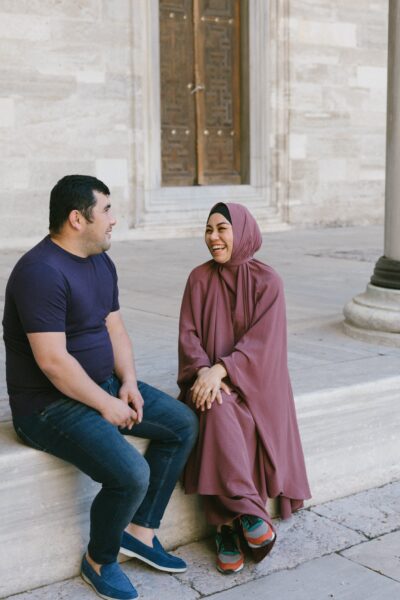You may know someone that’s a great listener. They make you feel heard, and give you their full attention. They’re hard to come by, especially in the world we live in today.
Everyone is occupied with one thing or another; even whilst your having a conversation, they are distracted by what’s happening around them or are scrolling on their feed. It’s hard to give someone your undivided attention when there is so much around grabbing it.
Today, on National Listening Day, we are highlighting key listening tips by looking at how the Prophet (saw) listened and communicated. There’s no greater example to follow, and his (saw) character was timeless – applicable today and beyond.

1. Body language
If you’re speaking to someone face to face, it’s important that your body language shows that your listening. If you’re sitting down, face the person fully. This way, when they’re speaking, they will feel heard and know that you’re listening to them.
If you turn your back to them, it sends the message that what they’re saying is not important and you’re not paying attention to them. Although this may not be your intention, this can make them feel less important.
The Prophet (saw) would turn his head as well as his torso towards the person speaking, regardless of who they were. He (saw) was the most beloved to Allah, and yet he still was humble and gentle enough to show respect and attention to the speaker.
Maintaining eye-contact is also a great way to show connection. It helps show the speaker that you’re giving them your undivided attention. As if you’re facing the person talking, but then your eyes are distracted by your phone or something else, this can send mixed messages.
2. Smiling
It’s not mandatory for you to smile throughout your conversations, as this can come across unnatural, but a reassuring smile towards the speaker or within a conversation can be helpful. It’s a friendly gesture and creates a bond between speaker and listener.
If you’re smiling, you’re not only following the example of the Prophet (saw) but it’s also as if you’ve given in charity. What a great reward!
Abdullah ibn Al-Harith ibn Hazm said, “I have never seen anyone who smiles more than the Prophet does.” (at-Tirmidhi).
The Prophet (saw) said “Smiling in your brother’s face is an act of charity.” (at-Tirmidhi).
3. Be aware of your tone and volume
Listening and conversing is a universal experience. There’s beauty in watching people communicate through different languages, sign, hand gestures and sounds. Also, depending on the topic of conversation, it can range from comical to serious.
When you’re listening, or speaking to others, always be aware of your tone and volume. Controlling your tone, and making sure you’re not raising your voice is important, to not come across abrupt or disruptive.
“And be moderate in your pace and lower your voice; indeed, the most disagreeable of sounds is the voice of donkeys.” [Qur’an: 31:19].
Speak with a clear tone and try to make your point as clear as possible so that the listener can understand what you’re saying.

4. Be just and open-minded
The Prophet (saw) said: “O Ali, if two people come to ask you to judge between them, do not judge in favour of the first, until you hear the word of the second, in order that you may know how to judge.” (Ahmad)
Although your daily conversations may not need you to listen to both sides of a story, it’s important that when you do listen to a conversation involving two people, you’re listening attentively to both sides and then collect your thoughts.
This makes it’s a balanced and fair conversation making both sides feel heard and accepted.
If you’re having a regular conversation between multiple people it can be difficult to make sure everyone has an equal opportunity to talk, but it’s polite to not talk over anyone, and or raise your voice to be heard.
5. Be open to advice and guidance
The Prophet (saw) was the torch bearer for good etiquette and character. He was given sent the word of Allah directly, and delivered the truth. Yet even he was not above listening to advice or guidance from others.
He sought advice from his wives, and even listened to the companions regarding issues. He did not discriminate regarding age, gender, race or status. Showing us that we should not be dismissive to listening to people and their advice, even if we may wonder what they could offer us. Being open to advice, and taking the time to listen can be beneficial and rewarding.

Listen up, and listen good
These are just a few tips on how we can improve our communication and listening skills to improve conversation. Pondering on how the Prophet (saw) is the greatest way to set us on the right track of improving our skills.
It can be difficult to implement these immediately into your routine, but try to focus on one at a time, and you will soon have upped your conversation game!